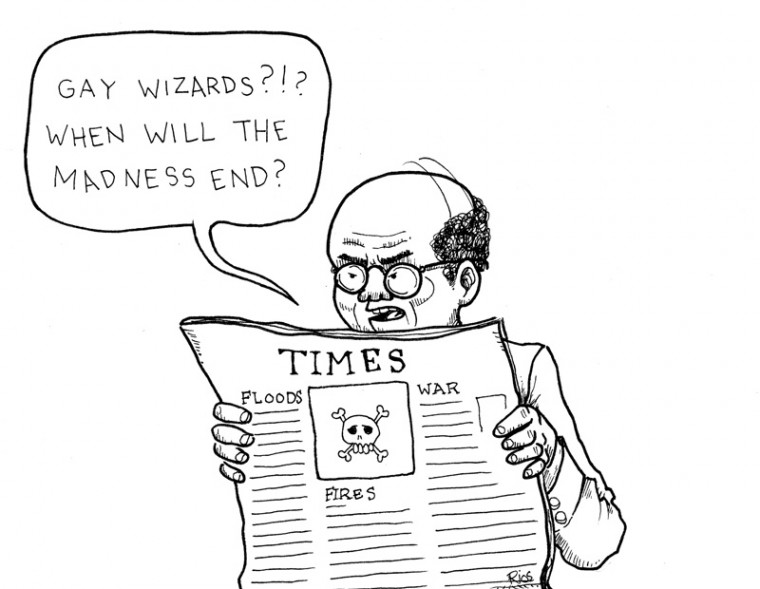Gay wizards are just another variable
November 8, 2007
Sometimes, it’s a good idea to begin by pointing out the obvious. Like cavemen, occasionally a writer needs to bash you over the head to get a point across. And there’s no better way to do that than using a platitude. So, apropos to today’s topic, here’s one for your consideration: human societies are scared to death of the “other.”
The statement speaks for itself, but only to a degree. After all, the “other” is a rather high-falootin’ concept. It has to do the idea of self and the assemblage of cultural ideas that help comprise an individual’s conception of self. But even if its origins lie in the writings of 19th century philosophers with often mispronounced names, that doesn’t mean it can’t apply to real world things. Things that affect every man, woman and child.
Things like gay wizards.
If you think Harry Potter doesn’t affect your life, you probably have a protracted existence – or, at least, one devoid of children. Over the course of a decade, Potter author J.K. Rowling has turned her fantasy tales into personal riches. But, perhaps surprising to some, they’ve also given kids and adults alike a renewed obsession with the written word, albeit one built on a fantastical world of giants, dragons and, of course, wizardry.
Simply, kids (and again, adults, too) forged a unique bond with the worlds and characters Rowling invented. So when Rowling told the world her character Albus Percival Wulfric Brian Dumbledore was gay, for some, it may have been as if their grandfather came out of the closet, daintily waving a rune-laden wand.
Rowling disclosed the juicy tidbit in front of a Carnegie Hall audience when a young fan asked if Dumbledore ever found true love. The crowd responded with gasps and then approving applause, perhaps a given since Rowling was speaking to her base. Elsewhere, opinions have been mixed.
It’s not unreasonable to take umbrage at the outing, even if you are a fan. On the one hand, the whole thing seems like a bit of an afterthought. If Rowling really wanted to have an impact, she could have introduced the character for what he was from the beginning. A cynical mind could even call it one last publicity hurrah before the Potter money parade is retired. Oh, and let’s not even get into the implications of the idea of a sexless old man – an authority figure, no less – who has a unique relationship with a young boy.
Problem is all these objections lose sight of the fact that the other has always been a focus of Rowling’s tales. The poor, dispossessed, marginalized and other social misfits comprise a bulk of her cast of characters, from the orphan Harry Potter to the lowly house-elves to little red-headed kids.
The inclusion of a homosexual character seems natural among these outcasts, taking consideration of the subtext of Rowling’s narratives. Frankly, it’s at least a little surprising that gays didn’t make more than an implicit appearance. Like all substantive fictional worlds, Rowling’s realm of wizardry is merely an inversion of our own culture, history, society and mores. If it didn’t reflect these realities, it would be a rather flat world.
Some critics have argued that such realism in these children stories are over the top. But let’s face it, the Harry Potter series transcended that label a long time ago, no matter what “The New York Times Book Review” might suggest. Besides, the novels have matured alongside the readership, never shying away from violence, death or hormones. Have no doubts that the reality of diverse sexuality is not lost on young readers.
More the reason to give attention to the outing of a popular fictional character. While it might strike some as irreverent news (and comparatively, it is), fiction has always provided us a framework by which we can approach the problems of the real world. By outing Dumbledore, Rowling merely helps children become more open-minded and thus, better able to rationally cope with the societal others that they will inevitably encounter in college, jobs and everywhere else.
I don’t know about you, but I think teaching tolerance is a good thing. The way things are going, I’m guessing it’s only a matter of time until Bert and Ernie are out of the closet, too.
Paul Rios can be reached at [email protected].
























































































































